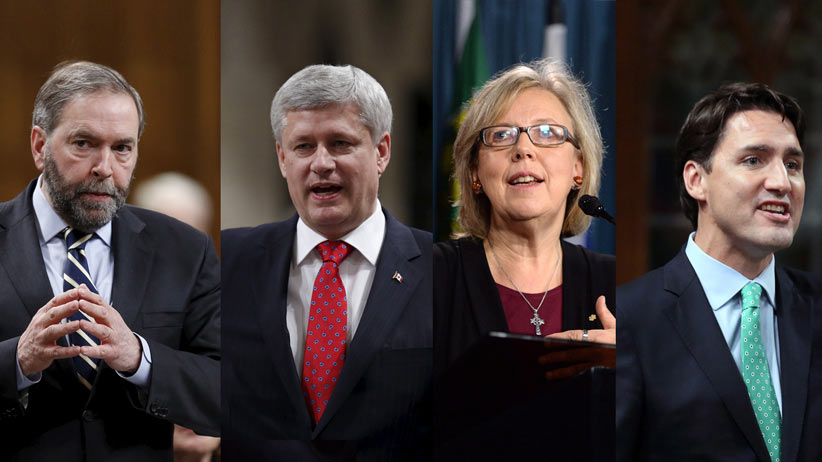Maclean’s debate: Four leaders. One stage. It starts here.
Party leaders face off on Aug. 6 in front of a national audience
Journalists watch a T.V. as the Speaker of the House of Commons Peter Miliken tallies votes in the the House of Commons on Parliament Hill in Ottawa Tuesday, May 10, 2005 the Conservative party and Bloc Quebecois are pushing for a non-confidence vote. (CP Photo/Jonathan Hayward)
Share

Federal party leaders tend to spend their summers on the barbecue circuit, glad-handing voters from coast to coast, always within reach of a hamburger and never far from an audience. Maclean’s and its Rogers broadcast partners plan to disrupt the dog days of summer with a hefty dose of substantive politics. Maclean’s political editor Paul Wells will pull the leaders into a spirited national leaders’ debate on Aug. 6 from 8 to 10 p.m. ET.
Canadians won’t have to go far to find the debate, which will offer voters their first glimpse this year of four federal party leaders—Stephen Harper, Thomas Mulcair, Justin Trudeau and Elizabeth May—on the same stage. It will be recorded in City’s Toronto studio and air live, commercial-free and with closed captioning, on City, OMNI.1, OMNI.2, and CPAC. It will also stream live at Macleans.ca, Citytv.com, CityNews.ca, OMNItv.ca, CPAC.ca, Facebook, YouTube, and on Rogers Radio stations at 680News.com, 570news.com, 660News.com, 1310News.com, News1130.com and News957.com. CPAC’s broadcast of the English-language debate will provide simultaneous translation into French, but the audience will reach beyond Canada’s official languages. OMNI will translate the proceedings into Italian, Mandarin, Cantonese and Punjabi in real time.
The debate marks a change in the usual Canadian electoral routine. In the past, a consortium composed of CBC/Radio-Canada, Global and CTV organized a broadcast of two debates, one in English and one in French. The consortium has claimed it would pull in the largest possible number of viewers. Liliane Le, a consortium spokesperson, took issue with what she claims is a limited audience for the Maclean’s debate. Wells, the debate’s moderator, isn’t concerned about any such limitations. “I’m confident that everyone in Canada who wants to see this debate will be able to see it,” he says.
Past debates ran in the middle of the campaign period. That the Maclean’s debate is first out of the gate, even if that comes before the writ officially drops, is vital, said Steve Maich, Rogers Publishing’s senior vice-president. “Canadians are facing an important choice for the country’s future in the upcoming election. Our goal is to start this most important conversation and to help shed light on the key issues on the minds of Canadians, as they prepare to cast their ballots.”
Related: What would you ask the leaders? Have your say on Facebook
Those key issues will run the gamut, from the economy and the environment, to foreign policy and the future of Canada’s democratic institutions. “The questions I ask will be at the intersection of what’s really important and what’s interesting,” says Wells. As for how the debate plays out, the moderator emphasized simplicity. “This is an incredibly elaborate construct, in terms of partnership with Facebook and three networks. That’s all outside the studio,” says Wells. “In the studio, we have worked hard to keep it as simple as possible.”
Debates often devolve into barking matches or talking-point bonanzas, played out on screen by trained federal leaders who come prepared for myriad attacks and counterattacks. Wells seeks a more useful conversation for voters, where leaders are “politely given” a second chance to answer a question they might have evaded. “I’m not planning on being the most fun guy in that room, but I also think it’s frustrating for everyone when a question just lies there and nobody touches it—when the really interesting thing would be that people actually address the question,” he says.
Wells says the formal debate process in Canada had become “caked in ritual.” Maclean’s wants to change that. “Our hunch is that we can have something that’s a little bit closer to just a conversation among serious people about serious things,” he says. “We’re going to try to make this debate more like that.”